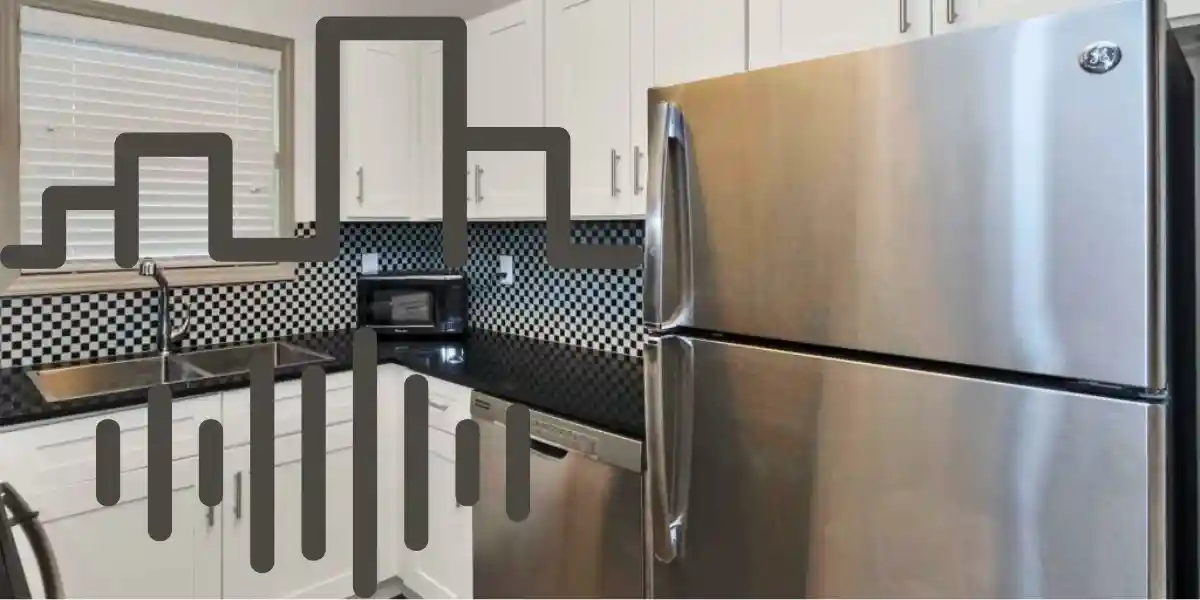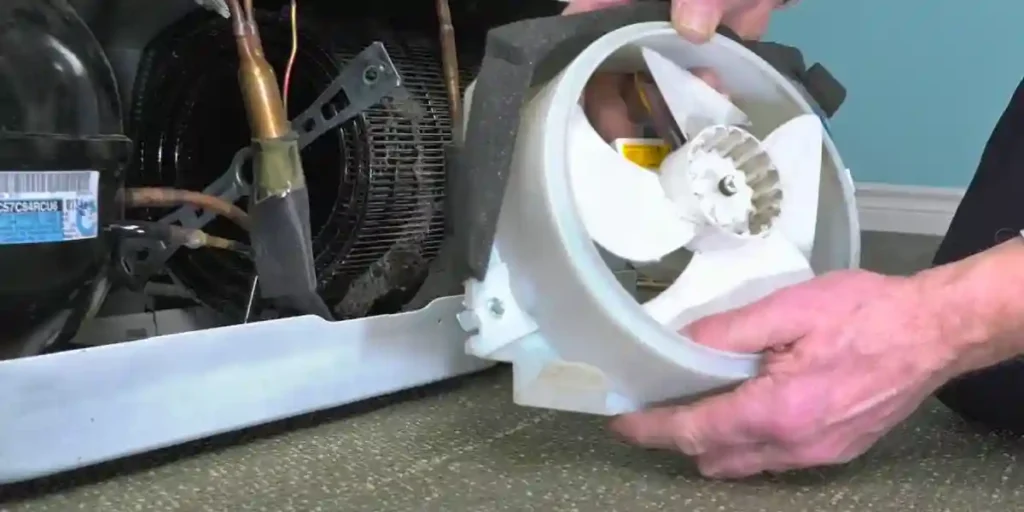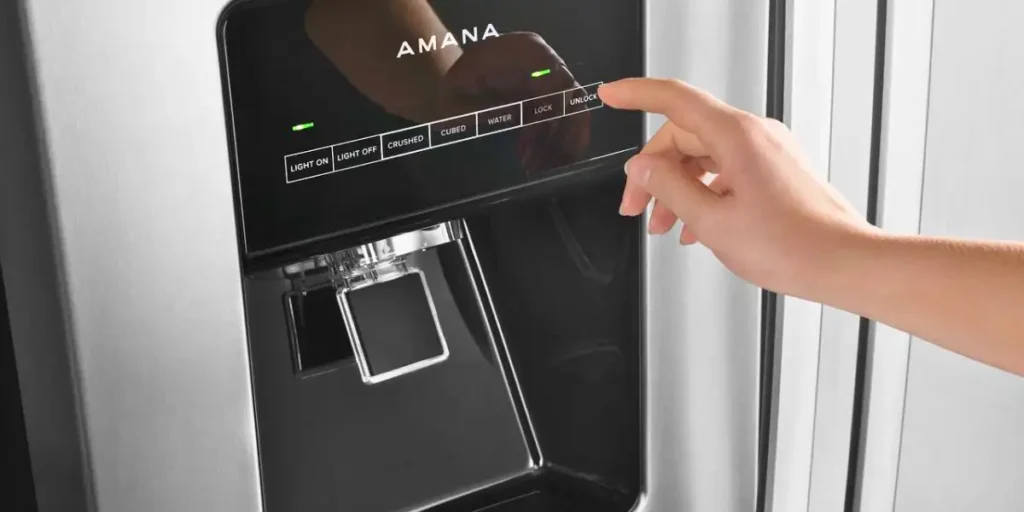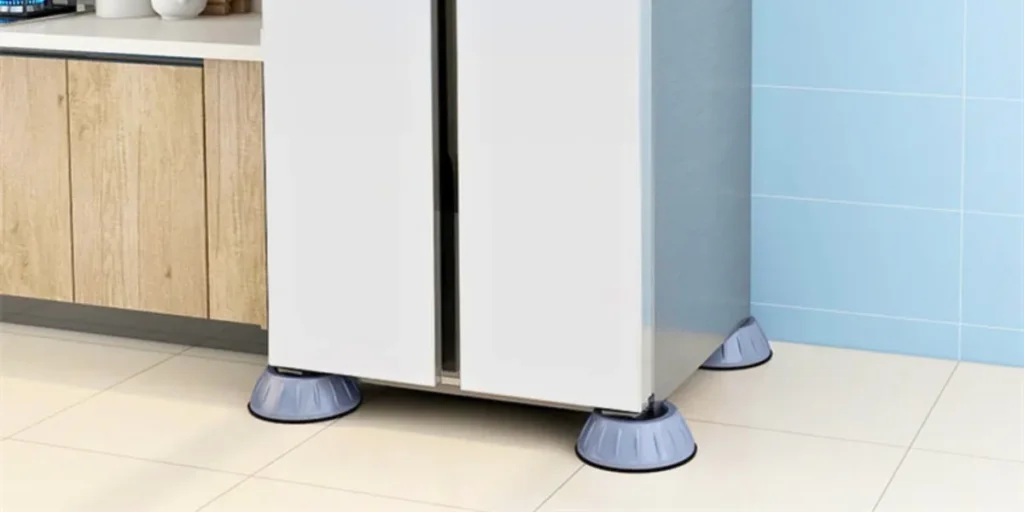Do you hear that mysterious rattling noise from your fridge when you close the door? Wondering what’s causing it?
Let’s unlock the secrets behind this fridge puzzle together! We’ll investigate the culprit and find out how to stop that pesky noise.

Fridge Making Rattling Noise When Door Is Closed
Is your fridge making a rattling noise when the door is closed? While some rattling is normal, excessive noise can be irritating.
The culprits may include the drain pan, condenser fan blades, defrost timer, or compressor.
To resolve the issue, check for blockages or uneven ground and enjoy a quieter fridge.
7 Steps To Keep Your Fridge Rattling Noise Free When The Door Is Closed
Step 1: Check for External Causes
Before diving into complicated fixes, let’s rule out simple issues. Ensure that the rattling isn’t caused by dishes or items on top of the fridge.
Also, check if the ice maker is the culprit. Sometimes, a frozen water line can lead to rattling sounds. Defrost the water line if needed, and adjust the water pressure if it’s too high.
Step 2: Address the Drain Pan
A common reason for rattling sounds is a misplaced drain pan or damaged supports. To fix this, locate the drain pan at the bottom of the fridge (usually behind the front grille) and reposition it securely.
Examine the supports for any bending or damage, and replace them if necessary. This simple step can make a significant difference in reducing noise.
Step 3: Clean the Condenser Fan Blades

The condenser fan, responsible for cooling the coils, can accumulate dust and debris over time, causing rattling or buzzing noises. Every six months to a year, take the following steps to clean the fan blades:
- Unplug the fridge from the power source.
- Pull out the fridge and remove the rear access panel.
- For fridges with rear coils, the condenser fan should be accessible.
- Use a vacuum cleaner with a brush attachment or a condenser coil cleaning brush to clean the fan and coils.
- Check for any damage to the fan blades and replace if needed.
- Ensure the fan blade is not loose or scraping against other components, causing the noise.
- Replace a worn-out fan motor grommet if necessary.
Step 4: Inspect the Defrost Timer Motor
The defrost timer prevents frost buildup by controlling the compressor and evaporator fan motors. If it’s malfunctioning, it can create a rattling sound. Here’s how to address this issue:
Identify the location of the defrost timer in your fridge (refer to the manual if unsure).
Disconnect the refrigerator from the power source.
Access the defrost timer, usually inside the temperature or thermostat control box or behind the control panel or bottom kick plate.
If the defrost timer is the problem, consider replacing it. This step may require professional assistance and the use of a multimeter for testing.
Step 5: Troubleshoot the Compressor
While some compressor noise is normal, excessive rattling may indicate a failing compressor.
If your fridge is relatively old and near its end of life (usually 10-15 years), replacing the compressor might not be cost-effective. Consider replacing the fridge instead.
Step 6: Fully Defrost the Appliance:
If you suspect a blocked evaporator caused by a faulty defrost system, fully defrost the refrigerator.
Unplug the appliance, remove the frozen food to a suitable place, and leave the doors open in a warm room for at least 24 hours.
Once fully defrosted, close the doors and switch the refrigerator back on.
Step 7: Contact the Manufacturer:
If the defrosting doesn’t resolve the issue and your refrigerator is under five years old, it’s best to contact the manufacturer, such as Samsung.
Inform them about the cooling problems in the fridge, the noisy fan, and the ice buildup at the bottom rear area.
They might advise another defrosting attempt, and if the issue persists, they may come to inspect the appliance and provide free repairs, including fitting new defrost-related components.
14 Maintenance Tips for a Rattling-Free, Quieter Fridge
1. Leveling Your Fridge
To ensure your fridge doesn’t make rattling noises, placing it on a level surface is crucial.
A spirit level can help you check if the fridge stands steady. If it’s tilting, you might need to adjust the leveling feet.
Turn the feet clockwise or counterclockwise to achieve proper balance. When the fridge is level, you’ll notice significantly reduced rattling sounds.
2. Clean the Condenser Coils
Dirty condenser coils can be a common culprit behind fridge rattling. The coils, usually located at the back or underneath the fridge, can accumulate dust and debris over time.
Unplug your fridge and gently clean the coils using a brush or a vacuum cleaner with a brush attachment.
Removing the buildup will reduce rattling and improve the fridge’s efficiency.
3. Check the Fan Blades
The fan inside your fridge helps circulate cold air, but loose or clogged fan blades can lead to annoying rattling noises.
First, turn off the fridge to avoid any accidents. Access the fan and examine the blades.
Tighten any loose screws you find, and if there’s any debris, carefully clean it out. With well-maintained fan blades, you can enjoy a quieter cooling experience.
4. Tighten Handles and Hinges
Fridge doors that rattle when opening or closing can be quite bothersome. The culprits are often loose handles and hinges.
Get a wrench and check all the screws on the handles and hinges. Gently tighten them to secure the door firmly.
This simple adjustment can make a significant difference in reducing those irritating rattling sounds.
5. Inspect the Water Dispenser

If your fridge has a water dispenser and it’s making rattling noises, it’s time to investigate. Start by turning off the water supply and unplugging the fridge.
Access the water dispenser carefully and look for any loose parts. Securely tighten any connections or screws you find.
A well-maintained water dispenser will keep you hydrated without the annoying rattling.
6. Stabilize Items Inside
When items inside your fridge move around, they can create rattling noises. To prevent this, organize the contents of your fridge and use containers to keep things stable.
This way, your groceries won’t clatter against each other when the fridge door is opened or closed.
7. Check the Drain Pan
A misaligned or loose drain pan can also lead to rattling sounds. The drain pan is located beneath the fridge, and sometimes it can shift out of place.
Carefully slide out the pan and reposition it securely. This small adjustment can make a big difference in reducing unwanted noises.
8. Adjust the Temperature Settings
Extreme temperature fluctuations can cause the fridge to vibrate and produce rattling sounds.
Check your fridge’s temperature settings to ensure they are appropriate for your storing items.
By maintaining stable temperatures, you’ll enjoy a quieter and more reliable fridge.
9. Tighten the Compressor Mounting Bolts
The compressor is a vital component of the fridge, and loose mounting bolts can result in rattling.
Locate the compressor, typically found at the back of the fridge, and inspect the mounting bolts.
If they are loose, use a wrench to tighten them carefully. This adjustment will help keep the compressor steady and reduce rattling.
10. Install Anti-Vibration Pads

If your fridge continues to rattle, consider using anti-vibration pads or rubber cushions beneath its feet.
These pads absorb vibrations, preventing them from turning into irritating noises. Simply place the pads under each foot of the fridge to enjoy a quieter kitchen environment.
11. Inspect the Fan Motor
A faulty fan motor can also be a source of rattling noises. Check your fridge’s manual to locate the fan motor.
Apply a few drops of lubricant to the motor as per the manufacturer’s instructions. Proper lubrication will reduce friction and noise, keeping your fridge quieter.
12. Regularly Defrost Freezer
An excessive buildup of ice in the freezer can lead to rattling sounds. Follow your fridge’s manual to defrost the freezer regularly.
Removing ice accumulation will ensure smooth operation and a quieter freezer compartment.
13. Keep the Fridge Well-Stocked
An empty fridge can echo and produce more noise. Keep your fridge well-stocked, but avoid overcrowding.
This allows for proper air circulation and minimizes any rattling sounds.
14. Schedule Professional Maintenance
If you’ve tried all these tips and your fridge still rattles persistently, it might be time to call in a professional technician.
They can conduct a thorough inspection, identify the root cause, and perform necessary repairs to restore your fridge’s tranquility.
FAQs
Is The Rattling Noise Harmful To My Fridge?
The rattling noise itself is not harmful to your fridge, but it may indicate an underlying issue that needs attention.
If left unaddressed, the loose parts or unbalanced fan can lead to more significant problems in the future..
Can I Fix The Rattling Issue Myself?
Yes, you can try fixing the rattling issue yourself before calling a professional. Start by identifying the source of the noise and checking for loose parts or debris.
Tighten any loose items and remove any obstructions around the fan area. In most cases, these simple steps can resolve the rattling noise and restore your fridge’s smooth operation.
How Can I Prevent Future Rattling Noises?
To prevent future rattling noises in your fridge, make sure to perform regular maintenance. Check and tighten the shelves, containers, and accessories inside your fridge regularly.
Keep the fan area clean and clear of any debris or food particles. Also, avoid overloading your fridge with heavy items, as this can cause imbalance and lead to rattling sounds.
Conclusion
While some rattling is normal, excessive noise can be bothersome. The culprits may include the drain pan, condenser fan blades, defrost timer, or compressor.
To enjoy a quieter fridge, check for blockages, clean the condenser fan blades, and ensure the fridge stands level on the ground.
Perform regular maintenance to prevent future rattling noises and keep your fridge running smoothly.
Ref: ttps://www.justanswer.com/uk-appliance/71i4p-fridge-making-rattling-noise-when-door-closed-assume.html
